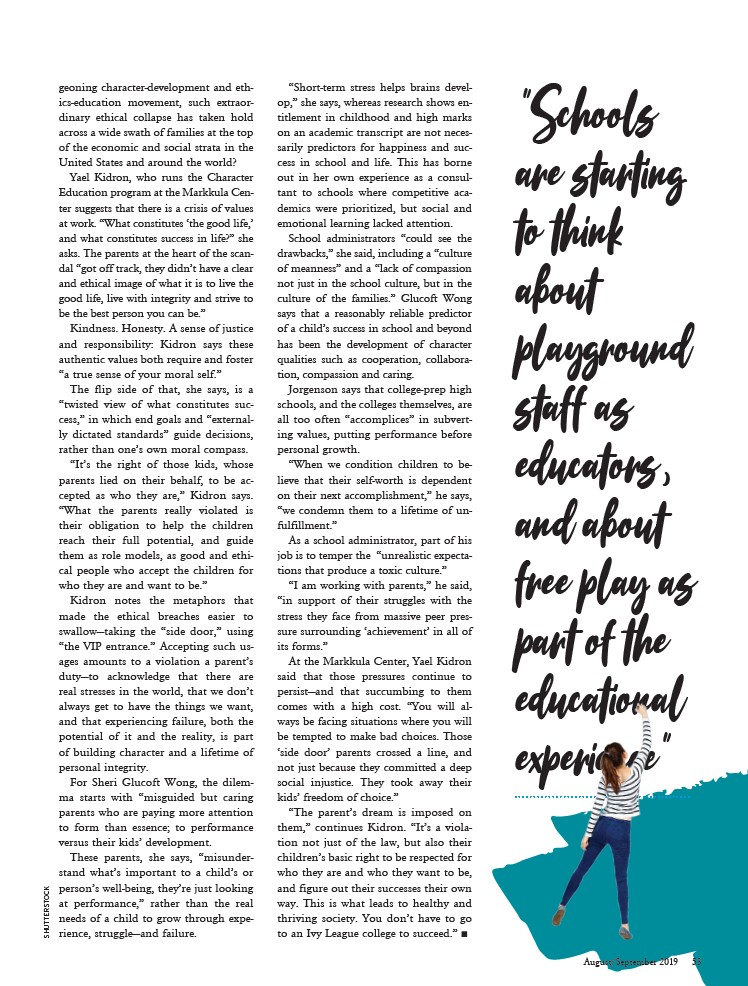
geoning character-development and ethics
education movement, such extraordinary
ethical collapse has taken hold
across a wide swath of families at the top
of the economic and social strata in the
United States and around the world?
Yael Kidron, who runs the Character
Education program at the Markkula Center
suggests that there is a crisis of values
at work. “What constitutes ‘the good life,’
and what constitutes success in life?” she
asks. The parents at the heart of the scandal
“got off track, they didn’t have a clear
and ethical image of what it is to live the
good life, live with integrity and strive to
be the best person you can be.”
Kindness. Honesty. A sense of justice
and responsibility: Kidron says these
authentic values both require and foster
“a true sense of your moral self.”
The flip side of that, she says, is a
“twisted view of what constitutes success,”
in which end goals and “externally
dictated standards” guide decisions,
rather than one’s own moral compass.
“It’s the right of those kids, whose
parents lied on their behalf, to be accepted
as who they are,” Kidron says.
“What the parents really violated is
their obligation to help the children
reach their full potential, and guide
them as role models, as good and ethical
people who accept the children for
who they are and want to be.”
Kidron notes the metaphors that
made the ethical breaches easier to
swallow—taking the “side door,” using
“the VIP entrance.” Accepting such usages
amounts to a violation a parent’s
duty—to acknowledge that there are
real stresses in the world, that we don’t
always get to have the things we want,
and that experiencing failure, both the
potential of it and the reality, is part
of building character and a lifetime of
personal integrity.
For Sheri Glucoft Wong, the dilemma
starts with “misguided but caring
parents who are paying more attention
to form than essence; to performance
versus their kids’ development.
These parents, she says, “misunderstand
what’s important to a child’s or
person’s well-being, they’re just looking
at performance,” rather than the real
needs of a child to grow through experience,
struggle—and failure.
“Short-term stress helps brains develop,”
she says, whereas research shows entitlement
in childhood and high marks
on an academic transcript are not necessarily
predictors for happiness and success
in school and life. This has borne
out in her own experience as a consultant
to schools where competitive academics
were prioritized, but social and
emotional learning lacked attention.
School administrators “could see the
drawbacks,” she said, including a “culture
of meanness” and a “lack of compassion
not just in the school culture, but in the
culture of the families.” Glucoft Wong
says that a reasonably reliable predictor
of a child’s success in school and beyond
has been the development of character
qualities such as cooperation, collaboration,
compassion and caring.
Jorgenson says that college-prep high
schools, and the colleges themselves, are
all too often “accomplices” in subverting
values, putting performance before
personal growth.
“When we condition children to believe
that their self-worth is dependent
on their next accomplishment,” he says,
“we condemn them to a lifetime of unfulfillment.”
As a school administrator, part of his
job is to temper the “unrealistic expectations
that produce a toxic culture.”
“I am working with parents,” he said,
“in support of their struggles with the
stress they face from massive peer pressure
surrounding ‘achievement’ in all of
its forms.”
At the Markkula Center, Yael Kidron
said that those pressures continue to
persist—and that succumbing to them
comes with a high cost. “You will always
be facing situations where you will
be tempted to make bad choices. Those
‘side door’ parents crossed a line, and
not just because they committed a deep
social injustice. They took away their
kids’ freedom of choice.”
“The parent’s dream is imposed on
them,” continues Kidron. “It’s a violation
not just of the law, but also their
children’s basic right to be respected for
who they are and who they want to be,
and figure out their successes their own
way. This is what leads to healthy and
thriving society. You don’t have to go
to an Ivy League college to succeed.” n
"Schools
are starting
to think
about
playground
staff as
educators,
and about
free play as
part of the
educational
experience"
August/September 2019 53
SHUTTERSTOCK